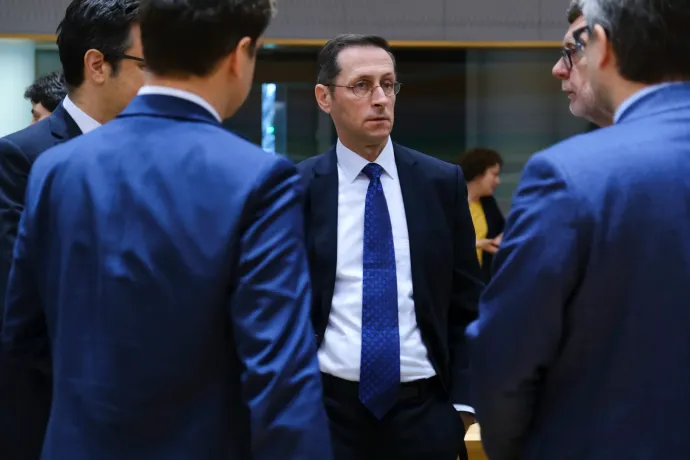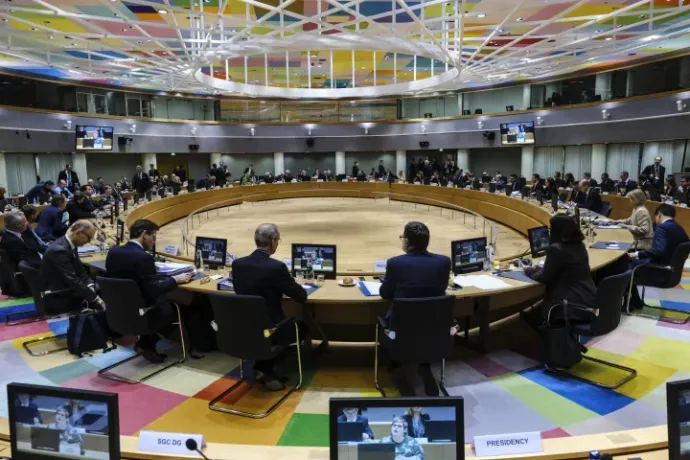
On Tuesday, Hungarian Finance Minister Mihály Varga indicated at the meeting of EU finance ministers that the Hungarian government does not support a joint EU loan to Ukraine. The chairman said they would examine their options if Hungary was left out. Decisions on freezing some 3,000 billion forints of Hungarian catch-up funds, the roughly 2,300 billion forint Hungarian recovery plan and the matter of the global minimum tax, which the Hungarian government opposes, were also postponed on Tuesday. The finance ministers are expected to meet again within a few days, but they may also discuss these issues at the upcoming summit of EU heads of state on 15 December, as decisions on Hungarian issues need to be made within weeks.
The Hungarian government vetoed the €18 billion joint EU loan to Ukraine at a meeting of finance ministers on Tuesday. It required a vote on three pieces of legislation, but Finance Minister Mihály Varga indicated he would not agree to the amendment to the joint financial regulation, which required unanimity, thus the package as a whole could not be adopted.
According to estimates, the EU candidate state, which is under attack from Russia, needs €3-4 billion a month in aid. The EU would contribute roughly half of this, which would be provided on a regular basis, from the beginning of next year, rather than the ad hoc aid that has been given haphazardly so far.
The Hungarian government has already indicated in advance that it does not support a joint loan. Government members have emphasized that it is not the willingness to send aid they are contesting, but the principle of EU member states borrowing together. Instead, they would give Ukraine its share of the EU's GDP bilaterally, and have sought to demonstrate their commitment to this with a government decision.
On the other hand, the EU could borrow together more cheaply, which – because of its relatively small GNP – would cost the Hungarian government less than, say, Italy.
Four cases became one package
The proposal for a common loan was put on the agenda for Tuesday's meeting of EU finance ministers at the Council of the European Union. Hungary was the key to almost all the important items of the day, because in addition to the loan,
- there would have also been a vote on the global minimum tax, which the Hungarian government also opposed, but this was dropped in the end, according to Népszava's Brussels correspondent Katalin Halmai.
- Originally, they would have also decided on the 5.8 billion euro (2,300 billion forints) Hungarian recovery plan, which the European Commission had proposed to approve with strict conditions. The vote had already been replaced on the agenda on Monday by an "exchange of views", which ministers presumably discussed in the afternoon.
- According to our sources, the European Commission's proposal to freeze some €7.5 billion (roughly HUF 3,000 billion) in catch-up aid for Hungary was discussed in the same way, during the breakfast before the official meeting.
Politico writes that the Hungarian veto postponed the decision on all three other issues. As he arrived at the meeting, Czech Finance Minister Zbyněk Stanjura, who chaired the meeting, said he saw the four issues as a single package.
Earlier, among others, the German foreign minister and an EU commissioner had accused the Hungarian government of trying to blackmail the other member states on EU funds and the rule of law with a veto on an issue that requires unanimity.
Following Hungary's blocking of the joint loan, Stanjura insisted that they want to give money to Ukraine by early January and will consider alternatives. "That means that we would look for a solution that 26 member states support." According to Politico sources, this would be a solution similar to enhanced cooperation. (Enhanced cooperation is useful precisely if only a certain group of member states agree to a proposal.)
A decision should be made within weeks
It is not known exactly when a decision on the aid for Ukraine could be reached, but the finance ministers do not have much time to meet again, as they have until 19 December to vote on one of the matters, the rule of law procedure, and seventy percent of the €5.8 billion (2,300 billion forints) for the recovery plan could be lost to Hungary if no agreement is reached by the end of the year.
In the first case, the European Commission launched the first ever such procedure against a member state in April. The rule of law mechanism was launched against the Hungarian government to protect the EU budget. The government made 17 commitments that the Commission said could in principle have been enough to stop the procedure if properly and fully implemented, but the EU body ruled that this had not been achieved and last week recommended freezing €7.5 billion (3,000 billion forints) in funding.

Tibor Navracsics, Hungary's minister for Regional Development and EU Funds, had previously said he expected a decision on the case on 12 December, and Politico has now suggested the same date, but there is no finance ministers' meeting on the official calendar for that date as of yet.
It could come in handy that the heads of state and government will also meet on 15 December before the final deadline. The European Council, which has a similar name to the college of ministers, is supposed to be non-decisional, issuing only "conclusions" by unanimity. In practice, however, this is where the most sensitive issues can be resolved at the highest political level. This is the case, for example, when voting rules mean that a unanimous decision is needed in the Council of Ministers anyway, or when several proposals are dealt with in the same package.
Earlier, the Hungarian government seemed to have also expected the Commission's proposal to be adopted, but even before Tuesday's Finance Ministers' meeting, the ministers had already split into several groups. One camp, reportedly the largest, was inclined to say that the Commission's rigor was excessive and that the Hungarian government's actions since 19 November should be acknowledged. "It should be noted that the Hungarian authorities have made some headway," a French finance ministry official told Politico. “A certain number of reforms have been implemented.”
According to the paper, the Germans are of a similar opinion, while the Italians would have the European Commission re-evaluate the latest reforms, and several Central European countries are against the freezing of the funds, while others would like to reduce the amount being frozen. The reason for this could also be their worry about the precedent it would set.
Radio Free Europe: more Member States fear a similar fate
According to Radio Free Europe, some governments fear that if, despite Hungary's efforts, the European Commission sticks to the suspension of 3,000 billion forints previously spoken of in September, it could just as tough with them on debt rules. In the EU – especially in the eurozone – there are supposed to be strict limits on how much a country can spend, lest others end up having to bail it out, as it had to be done with the 2008 crisis bailouts. The already poorly enforced rules were suspended for the duration of the Covid crisis, but are expected to return in a renewed form soon.
Two sources told the news source that the qualified majority for freezing the funds might be lost in the Council. It would be a "total disaster", one of the sources told Politico, describing what it would mean if the new mechanism for protecting the EU budget were to fail the first time around. According to the paper,
there are about a dozen or so opponents in total, and if they include the three most populous member states (France, Germany and Italy), no proposal can pass against them, but – unless they scrape together 15 countries by converting a few more member states – they can't vote on anything either.
According to information from 444, the Council has asked the Commission to reassess by Friday how many of the 17 commitments Hungary has properly fulfilled (i.e. beyond the original deadline of 19 November, since some legislations will even be voted on in the Hungarian Parliament this week). According to the Hungarian Parliament's agenda, votes have even been scheduled for the day of the EU Finance Ministers' meeting and afterwards on "Amendments to certain laws at the request of the European Commission necessary for the successful conclusion of the conditionality procedure", so the results of these may also be considered.
Hungary could lose 1650 billion forints for good
Time is working both for and against the Hungarian government: if the 19 December deadline simply passes, the rule of law procedure will end without any freeze having been adopted. The European Commission has previously warned that the procedure could be reopened at any time. It is questionable how much sense this would make if no agreement could be reached at the first attempt, but the European Parliament would probably increase the already considerable political pressure.
As for the recovery plan, however, up to seventy percent of the €5.8 billion (roughly 2,300 billion forints) could be lost for good if no agreement is reached by the end of the year. That would be nearly 1700 billion forints. The plan would detail how the Hungarian government would spend the country's €5.8 billion (roughly 2,300 billion forint) share of the one-off EU fund over and above the common budget that was set up to deal with the effects of the Coronavirus pandemic. The European Commission has proposed that ministers give their nod to the plan, but until 27 "super milestones" – including the 17 rule of law commitments – are met, nothing should be paid out.
Hungarian reforms to be reassessed
At the end of the meeting, Zbyněk Stanjura confirmed that the four issues would be dealt with as a single package and that the European Commission would be asked to reassess Hungarian reforms. He is confident that an agreement can be reached within days – even in a video conference instead of a face-to-face meeting.
Trade commissioner Valdis Dombrovskis reassured everyone by saying that they could at least start preparing the loan for Ukraine with one out of three pieces of legislation voted through, but "the EU must show solidarity and respect the promises it has made to Ukraine".
For more quick, accurate, impartial news from and about Hungary, subscribe to the Telex English newsletter!